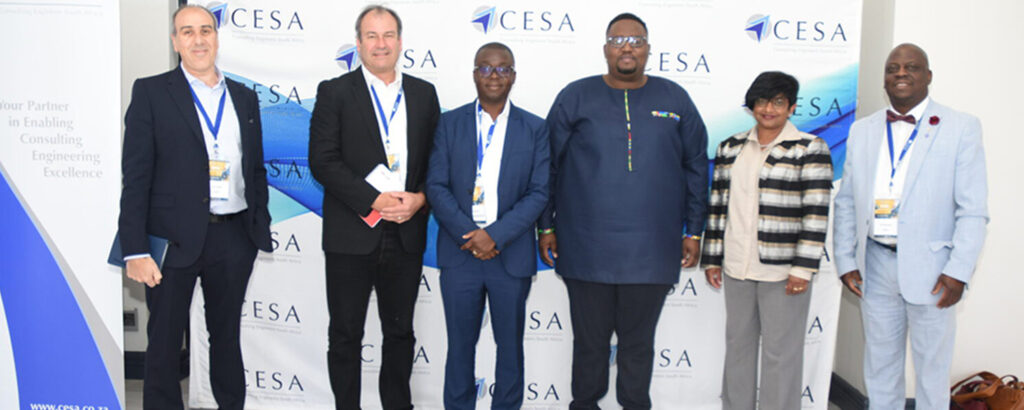

CESA Infrastructure Indaba 2022 – DAY 2 – South Africa has a huge Procurement crisis impacting service delivery!
Day 2 of the annual CESA CESA Infrastructure Indaba held on the 18th and 19th August, kicked off with discussions centring largely on procurement and public infrastructure projects; engineering capability and technology; and water security. A strong message carried through across both conference days focused on the serious impact of the procurement crisis and need for the implementation of a capable infrastructure project pipeline as being critical for the sustainability of the industry as well as the impact on the economic recovery of the country.
In the session focused on Procurement and Public Infrastructure Projects presentations included ‘Building a capable industry & state – holistic anti-corruption approach,’ presented by Julien Rumbelow, Co-Founder, Director at GIACC-SA; A fresh approach to the procurement of public infrastructure projects by Ivor Chipkin, Government and Public Policy (GAPP); Implementing an integrated strategy for the reconstruction, growth, and development of the construction industry by Bongani Dladla, CEO, CIDB; and Global Approach – procurement magnifying the impact of consulting engineers on projects and societal needs by Malani Padayachee-Saman, Consulting Engineer, MPAMOT.
Chipkin stated, “We have a huge procurement crisis – we have lost control with the consulting engineering industry bearing the brunt of the chaotic consequences.” He believes that we need to push forward with depoliticizing, professionalising, and bringing transparency to the public service. Pressure needs to be put on government to transform.”
Dladla presented several challenges affecting the construction sector, “We are facing the severe consequences of unemployment and without meaningful transformation the construction sector is not sustainable. Tender cancellations are a major issue, we need more punitive measures as it is killing businesses, in addition the longer we delay projects the more they cost,” stated Dladla. Most importantly he called for the implementation of a capable infrastructure project pipeline as being critical for the sustainability of the construction industry.
Rumbelow in his presentation stated, “We need to build an anti-corruption culture in South Africa through training and various interventions, putting in measures that make it difficult to happen in the first place.”
Padayachee-Saman, discussed global trends including the climate crisis, socio-economic risks, the debt crisis, supply chain bottlenecks and issues of diversity and inclusivity. “We need to have strategic alliances with both the public and private sector in dealing with issues of procurement.” In relation to our current skills crisis in the country she stated that our challenge is to keep our professional engineering skills within the country.
The Engineering capability & Technology session facilitated by Renee Petersen, CESA YPF Chairperson & SMEC included presentations by Brenda Lacey-Smith, Manager: Education and Training, we focused on Sculpting the future of consulting engineering. Municipal engineering’s impact on communities by Vuyani Gxagxama, Northern Provinces Branch Chairperson, IMESA. Creating an enabling environment for next generation innovative solutions by William Moraka, SALGA, and Best Practice: Technology & Engineering Innovation in consulting engineering by Warren McLachlan, Professional Engineer, SMEC.
Gxagxama, stated, “Service delivery particularly related to infrastructure is the major challenge for all municipalities, due to numerous issues including lack of technical capacity, procurement processes causing delays, underfunding and lack of maintenance with massive infrastructure backlogs”.
Moraka in his presentation stated, “We at SALGA are focused on smart solutions for the management of services and have created a detailed plan of priorities for a digital future focused on smart solutions related to infrastructure and revenue management strategies”. He went on to say, “We would like to change the narrative of municipalities focusing on driving key priorities that include procurement and funding to reconfigure for technology and innovation.”
Lacey-Smith in her presentation on the CESA Business of Consulting Engineering (BCE) Management Development Programme asked, “How do we turn good consulting engineers into excellent consulting engineers capable of managing the ‘business of consulting engineering?” The BCE programme’ focuses on subjects such as Project Delivery, Legal and Contractual Matters, Business and Project Finance as well as Inter-personal Skills aimed at upskilling, mentoring and transformation of the industry.
McLachlan, stated, “Do not let technology take the engineer out of engineering and cautioned that we need to use the technology to enhance our work and not replace it!”
In the session focused on Water Security facilitated by Uzair Osman, YPF Deputy Chairperson from Bosch Projects, panelists included Dr. Sean Phillips, Director-General, DWS; Prof. Mbangiseni Nepfumbada, Co-Director: Joint Research Centre – Water, Environmental Science & Technology (JRC-WEST); and Andi Rweqane, Royal HaskoningDHV.
Dr Phillips in his presentation stated, “We need to start doing things differently to address the deterioration of our water supply systems. The main cause is the weakness in governance and management in municipalities!” The DWS is supporting and intervening on an unprecedented scale led by the Minister of Water and Sanitation, Mr Senzo Mchunu, who is identifying municipalities where water and sanitation services are dysfunctional and initiating interventions.
Prof Nepfumbada in his presentation discussed the National Water Security Framework (NWSF) Approach and highlighted that we need to transform, and compliance is not reason enough! He noted that it is critical to have the correct skills to specify project requirements – ‘as a solution is as good as the specifications provided!
Rweqane, stated, “Water scarcity is now one of the leading challenges for sustainable development”. She discussed ‘smart water’ with the need to optimise and automate designs through the use of digital twins as we plan for our future.
In closing, Chris Campbell, CESA CEO said that discussions over the two-day conference inspired thinking towards approaching infrastructure development from an entire lifecycle perspective.
CESAPresident Olu Soluade concluded the event by presenting resolutions which were developed over the course of the indaba.
